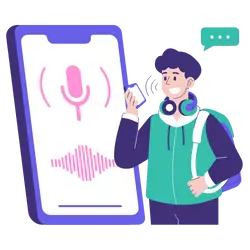Introduction
The world of online education has been changing faster than we could have imagined. If you think back to the early days of e-learning, it probably meant watching pre-recorded videos and answering some quizzes. But with AI stepping into the picture, it’s a whole new ball game. AI is no longer just a buzzword, it’s reshaping the way we learn, teach, and interact with knowledge online. So, how exactly is AI transforming online education? Let’s dive in.
Personalized Learning: The Future is Tailored
Remember those days when you had to sit through an entire lecture, even if you already knew half of the material? Or when the course content seemed way over your head, but there was no way to catch up? Well, AI has a solution for that. Imagine a classroom where the pace, style, and content are customized to fit you. AI can make that happen.
By analyzing data from student interactions, AI tools can adapt lessons in real time, offering a personalized learning path for each individual. For example, if you’re breezing through a history course but struggling with a specific math concept, AI can detect that and offer targeted resources to help you catch up. On the flip side, if you’re excelling, it might challenge you with more complex problems to keep you engaged. In short, AI ensures that you’re not left behind or bored out of your mind.
AI-driven platforms like Duolingo for language learning already use personalized strategies. The app analyzes your progress and tailors exercises to your learning speed, making the experience feel like a one-on-one tutoring session. It’s like having a personal coach, but at a fraction of the cost.
Example: AI-Powered Adaptive Learning
Take Smart Sparrow, for example. This online platform uses AI to create custom learning experiences for students in fields like biology and engineering. If a student answers a question incorrectly, the system doesn’t just tell them they’re wrong. Instead, it adapts the next questions and content to address their specific misunderstanding. It’s like having a teacher who knows exactly where you’re struggling and adjusts the lesson accordingly.
AI Tutors: A Personal Assistant for Every Student
In many online courses, students might feel like they’re left alone after a lecture. While forums and discussions can help, sometimes you just need a quick answer to a specific question. Enter AI tutors.
AI tutors are becoming an invaluable part of the online education experience. They’re available 24/7, don’t need coffee breaks, and can handle multiple students at once without breaking a sweat. Tools like Jill Watson at Georgia Tech University were built to answer students’ questions and help them navigate their course material, all while looking like a human TA (teaching assistant). It’s a simple chat-based interface where you can ask questions, and the AI responds with tailored answers based on the course content.
It doesn’t just stop there. AI tutors can monitor your progress and even give feedback on assignments. They’re like an ever-present, non-judgmental guide, ensuring you stay on track. You can ask the same question ten times without feeling guilty. Try doing that with a human tutor!
Example: How AI Tutors Work
Let’s say you’re working on an essay about Shakespeare’s plays. You’ve written your draft, but you’re unsure about how to phrase a particular point. You ask the AI tutor for feedback. The system will analyze your writing style, offer suggestions on grammar, sentence structure, and even suggest relevant quotes from the plays. It’s like having an essay editor available at all hours of the day or night.
Data-Driven Insights: Real-Time Analytics for Students and Educators
Online courses often come with a lot of data, how long you spent on a video, how many quizzes you’ve completed, and even which questions you got wrong. But how can all this data be used to help you improve? That’s where AI’s real power lies.
AI systems can analyze your performance over time and identify patterns that might not be obvious to a human instructor. For example, AI can tell if you’re consistently struggling with certain types of problems, whether that’s a particular chapter or a specific concept. Once the AI flags this, it can suggest tailored learning materials or alert the instructor to provide additional help.
For educators, AI offers valuable insights that help them understand how their students are progressing. It helps them identify which parts of a course might need improvement or which students need more attention. Instead of guessing or relying on generic feedback, AI can give real-time, actionable insights.
Example: Using AI to Improve Course Design
Some platforms like Coursera and EdX already use AI to help instructors refine their courses. They gather data about how students interact with the content and flag sections that students consistently struggle with. In response, instructors can adjust the material, making it easier to digest or offer alternative learning methods. This results in better engagement, fewer dropouts, and ultimately, more successful learners.
AI and the Future: What’s Next?
If we think about where AI could take us in the future of online education, the possibilities seem endless. Virtual reality (VR) classrooms powered by AI? Real-time, adaptive simulations that teach everything from physics to philosophy? AI could even make group projects easier by suggesting the perfect collaborators based on skills and learning styles.
One exciting prospect is the use of AI in peer assessment. Imagine being able to grade your classmates’ work using AI-powered tools that ensure fairness and accuracy, giving each student valuable feedback while also teaching them how to critically evaluate others’ work. It’s like having a grading assistant who’s objective and can handle a large volume of assignments without a hitch.
Example: AI in Virtual Classrooms
One of the most fascinating developments is AI-driven virtual classrooms. In the future, platforms like ClassVR may use AI to create immersive environments where students can engage with content in ways that go beyond traditional video lectures. Imagine studying ancient Rome, not from a textbook, but by virtually walking through the streets of the city, interacting with digital recreations of historical figures. AI could help design personalized experiences within these virtual environments based on the learner’s preferences, allowing for highly engaging and memorable lessons.
Conclusion: The AI Classroom is Here to Stay
The transformation of online education through AI is just the beginning. From personalized learning paths to real-time analytics, AI is reshaping how we learn and teach. While there are still challenges to overcome, like ensuring equitable access and addressing privacy concerns, the future looks bright. AI is not here to replace teachers but to empower them. It’s the ultimate learning assistant, helping students reach their full potential. So, the next time you log into an online course, you might just find that your AI tutor is ready and waiting to make your learning experience more tailored, efficient, and, yes, even a little fun.
If you’re considering diving into online education, remember: AI isn’t just an added feature; it’s the game-changer. Stay curious, embrace new tools, and watch how AI continues to elevate the learning experience.



